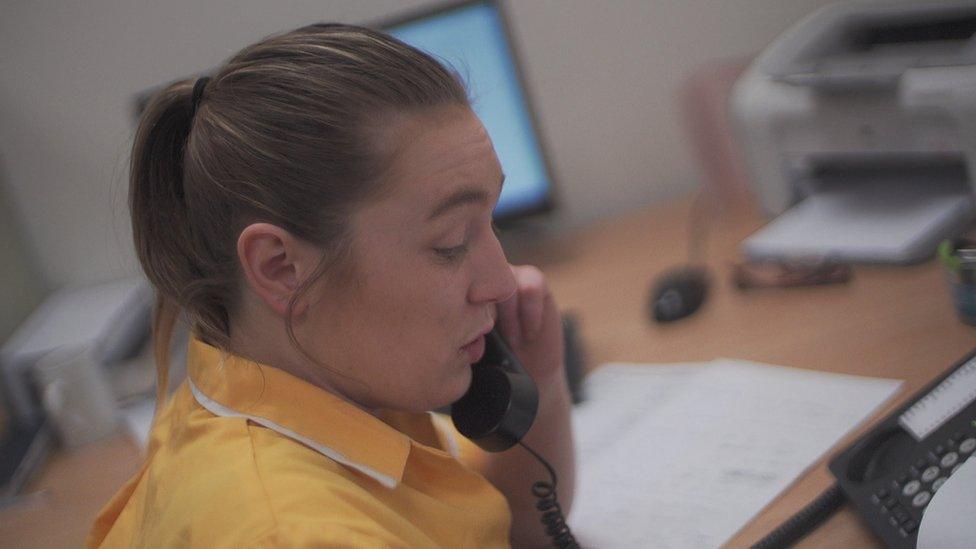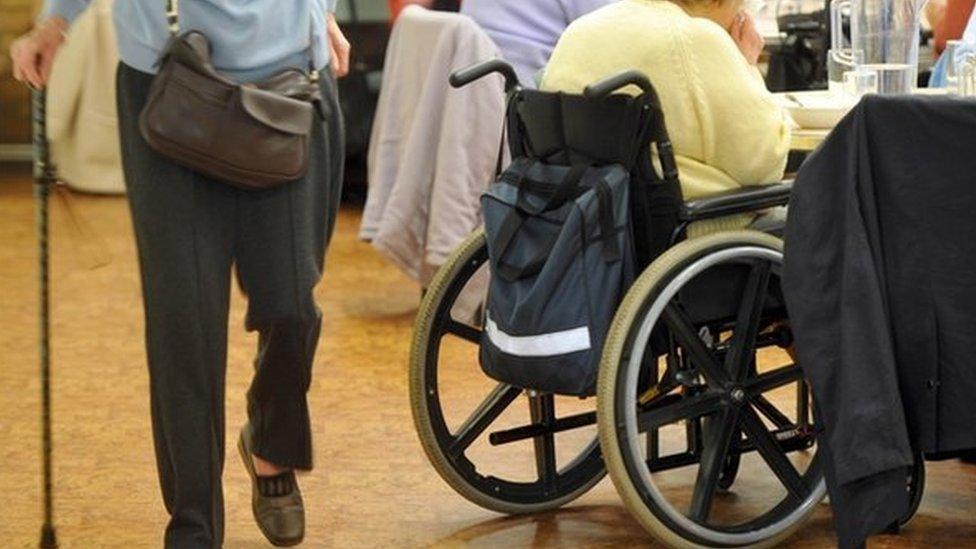Care worker zero-hours contracts tackled by Welsh Government
- Published
- comments

There has already been a consultation on recruitment issues facing the care sector
A planned curb on zero-hours contracts for thousands of care workers has been unveiled by the Welsh Government.
Workers will be given the choice after three months whether they want to carry on with the arrangement or move onto a minimum-hours contract.
Proposals also aim to tackle so-called "call-clipping", when care time is cut short by travel between visits.
Research found a "substantial number" of workers caring for people in their own homes were on zero-hours contracts.
The figure has been estimated at anywhere between 56% and 80% of the workforce in domiciliary care.
However, the chairman of Care Forum Wales said the proposals would "do nothing" to address the "serious issues" in the sector.
Most of the estimated 18,000 care workers in Wales work for private care companies, as opposed to being directly employed by local councils.
But those representing independent care providers say zero hours contracts are not the main issue. Instead they are concerned about how councils commission care services - a process which they said is "driving prices and standards down".
'Fairer deal'
Under the new Welsh Government proposals, employers would have to offer the worker a range of contracts, including a minimum-hours contract based on the average hours previously worked.
Social Services Minister Rebecca Evans said: "While some staff prefer zero-hours contracts, valuing the flexibility they can offer, for many the uncertainty and insecurity they pose can have a hugely-detrimental impact on their lives.
"Crucially the plans we are putting out to consultation today will ensure employees have a choice. After three months of employment, they will be able to choose whether to move onto another zero-hours contract, or take up alternative contractual arrangements."
She said it was also about safeguarding the quality of care, addressing issues around the continuity of care and communication between workers and the people they supported.
Under the proposals, care providers would also need to distinguish clearly between travel time and care time when arranging services. Research has found 39% of home visits in Wales are less than 30 minutes.
Ms Evans added: "Doing so will help tackle 'call-clipping', ensuring people's care and support time is not eroded by travel time between visits."


CASE STUDY: CARE WORKER
"All or nothing - at the moment we've got loads of hours but as soon as someone goes into hospital we lose four calls a day and then it affects us a lot.
"And because we do four on, four off, so we work three days, so then you get hardly anything for the week."
Extract from interview during research into domiciliary care workers recruitment in Wales by the Centre for People and Performance, Manchester Metropolitan University Business School, 2016.

The proposals have emerged following research for the Welsh Government published last year.
It also heard from independent care providers, who believed local councils, under budget squeezes, were putting an emphasis on price over quality, external.
Councils paid an average hourly price of £14.24 when commissioning care services in the home in 2015.
The UK Home Care Association has already warned of "desperation" from financial and recruitment pressures.
Mario Kreft, chairman of Care Forum Wales, said there needed to be "a root and branch" review and an end to the "economics of the lowest common denominator".
"The chronic problems afflicting the domiciliary care sector run far deeper than the issue of zero hours contracts," he said.
"Domiciliary care in Wales is mired in crisis and these proposals will do nothing to address the serious issues which are resulting in companies either closing down or relinquishing contracts because they are just not viable."
He said one Wrexham company was forced to hand back a nearly £1m contract to the council because it was costing them money to provide a service that was totally unsustainable.
Unison Cymru's organiser Andy Rutherford said the care sector had been starved of money through UK government cutbacks, and zero-hours contracts were a symptom.
"Yes, the Welsh Government is to be commended for taking action here, but let's look at the procurement process as a priority. Councils should not be allowed to pass the buck," he said.
A two-month consultation on the proposals will run until 7 August. Ministers want them to come into force in April 2019.
- Published20 March 2017

- Published26 May 2017

- Published20 March 2017

- Published23 August 2016

- Published19 October 2016

- Published1 May 2017
